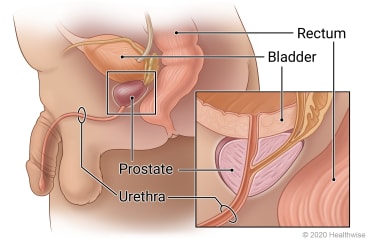
How can you decide between radiation and surgery for localized prostate cancer?
What is localized prostate cancer?
Prostate cancer is the abnormal growth of cells in the prostate gland. Cancer that has not spread outside the prostate gland is called localized prostate cancer.
People with localized prostate cancer have options for their care. Some people with a slowly growing cancer choose active surveillance. This means that their doctors will watch them closely with regular checkups and tests. If their cancer grows, then they can decide about treatment. And some people choose watchful waiting. This means they don't want any treatment that tries to cure their cancer. Other people choose to treat their cancer right away. They can choose to have radiation to destroy the cancer cells in the prostate. Or they can choose to have surgery to remove the prostate (radical prostatectomy).
Test results, including the Gleason score from your prostate biopsy, show if a localized prostate cancer is likely to grow.
- Low-risk means that the cancer isn't likely to grow right away. There is a chance that it may grow so slowly that it never causes any problems.
- Medium-risk means that the cancer is more likely to grow.
- High-risk means that the cancer will most likely grow right away.
Some people may have limited treatment choices because of their health. For example, a person who has serious health concerns may not be well enough to have surgery. Or a person who has a serious bowel disease such as ulcerative colitis may not be able to have radiation. Your doctor will help you know if you have options.
This information is about choosing between radiation or surgery.
What are the key points about this decision?
- Radiation or surgery may be used to treat your prostate cancer. Both treatments work well. With either treatment, the chance of your cancer spreading is low.
- Both treatments can have side effects, such as bladder, bowel, and erection problems. Radiation is more likely to cause bowel problems. Surgery is more likely to cause leaking urine or erection problems.
- How you feel about each treatment may affect your choice. For example, you may choose surgery because you want the cancer removed through an operation. Or you may choose radiation because you want to avoid major surgery and its risks.
Why might you choose surgery?
If your goal is to treat the cancer by having your prostate removed, then you may want to choose surgery. For some people, the idea of "getting the cancer out" brings a sense of relief. For others, avoiding radiation may be what is important to them.
Why might you choose radiation?
If your goal is to treat the cancer and avoid the risks of major surgery, then you may want to choose radiation. For some people, preserving their sexual function for as long as possible is what they value most. Having radiation rather than surgery may help them avoid erection problems.
Your decision
To make the decision that is best for you, take the time to understand your options. Sometimes the medical facts will guide your decision. But a good decision also reflects what matters most to you. This includes how you feel about radiation or surgery and the likely side effects.
- Find out about the treatments. What would your radiation treatment plan be like? Or if you choose surgery, how would your surgery be done?
- Find out about the side effects. How important to you is being sexually active and being able to maintain an erection? If leaking urine is a side effect of your surgery, how much would that bother you?
Think about what you value. Then talk with your doctor.
Where can you learn more?
Go to http://www.healthwise.net/patientEd
Enter X654 in the search box to learn more about "Deciding Between Radiation and Surgery for Localized Prostate Cancer".
Current as of: October 25, 2024
Author: Ignite Healthwise, LLC Staff
Clinical Review Board
All Ignite Healthwise, LLC education is reviewed by a team that includes physicians, nurses, advanced practitioners, registered dieticians, and other healthcare professionals.

